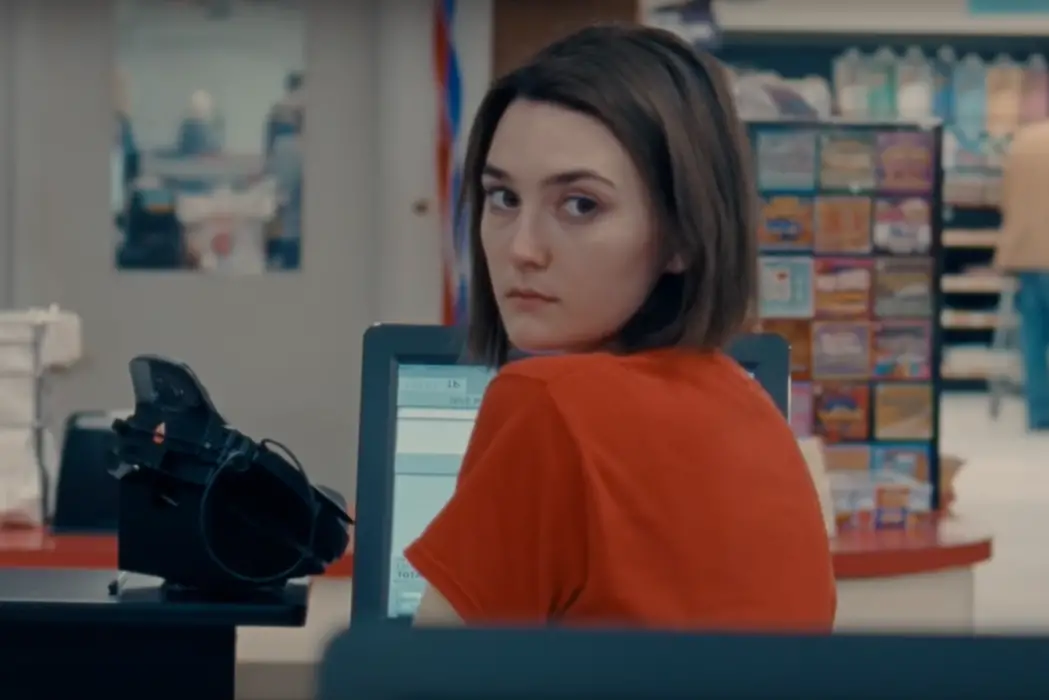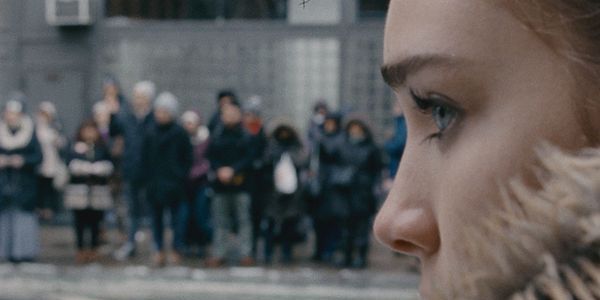Sundance 2020: Interview With NEVER RARELY SOMETIMES ALWAYS Director Eliza Hittman & Stars Sidney Flanigan And Talia Ryder

Wilson is a cinema enthusiast based out of Toronto, Canada.…
The latest film by Eliza Hittman, Never Rarely Sometimes Always tackles the barriers women experience when faced with an unintended pregnancy. Similar to her last outing at Sundance – the masterfully crafted Beach Rats – this is a socially conscious film that is unflinchingly honest. It features two of the best performances at the festival so far, with newcomer Sidney Flanigan and rising star Talia Ryder commanding every frame of the film from start to finish.
Wilson Kwong for Film Inquiry: At yesterday’s screening of the film, you [Hittman] mentioned that in order to do research for the film, you did some field work and actually went on buses to travel across different states. For Sidney and Talia, did you two do any research to prepare for the film?
Sidney Flanigan: There wasn’t really time to do any research. It was a 27 day shoot, and we only had two days for rehearsal and an apartment.
Talia Ryder: Rather than doing research, I think it was really important for us to understand our characters, and to get to know each other and create a bond that’s real onscreen and off. So we just spent those couple of days really getting to know and understand each other better.
And Eliza, was there anything you did specifically to help Sidney and Talia prepare?
Eliza Hittman: Yeah, we did a few things. We did some grooming; I had Talia and Sidney put makeup on each other, like the scene in the film that you saw. We sat together and Sidney played guitar for us, and we listened to her play. But the main thing was I gave them each a journal and I asked them very personal questions. Then I left and I let them free write for an hour and share with each other. There were questions about themselves, questions about their family and questions about their ambitions. It was a way to build a history very quickly between the two of them, and a secret bond that only they shared on our set.
Did they share those answers with you afterwards?
Eliza Hittman: No, it was none of my business.

One of the most striking things about the film it the lack of dialogue, and how a lot of the communication was done non-verbally. For a first time actress [Sidney] and relatively new actress [Talia], did this make the role more challenging to perform?
Sidney Flanigan: It was weird because there were times where I never wanted to overthink it, so I just did whatever felt natural and never put too much thought into it. But there were also moments where I was like, ‘Am I making the right face or something?’ I don’t know, I never really thought about it too much, I just tried to do what felt right.
Talia Ryder: The lack of dialogue made a lot of sense to me. Because for our characters and the moments in the film, we wouldn’t have an in depth conversation about what was going on because we didn’t need to. We just understood things, and it wasn’t something that we constantly had to be talking about.
Eliza Hittman: I also think when you take away dialogue, actors begin to look for other ways to communicate.
One thing that I noticed was how despite covering some relatively dark and serious material in the film, there’s also a sense of hope in this story. And I think a lot of this stems from the relationship between the two main characters. When you were acting out these roles, was this idea of hope somewhere in the background?
Sidney Flanigan: I think to an extent, yes. It’s like, they’ve made it this far and we’ve gotten here and now it’s over.
Talia Ryder: I feel like it’s more hopeful, not necessarily right at the end because Skyler has a lot more to think about than in the beginning. But I do think there is that aspect of hope because they have each other, when a lot of people in similar situations don’t have someone like a cousin, or someone that they love that much to rely on.
Eliza Hittman: I think that I was hesitant to lift up the end of the film in an artificial way. For me, I want the audience to feel more a sense of relief with her, as she drifts off to sleep. But she’s going home, and I don’t know if that’s such a hopeful thing either.
And for audiences who aren’t necessarily familiar with all the rules and regulations in America, are the events in this film only applicable to a certain state?
Eliza Hittman: It’s specific to Pennsylvania and the obstacles that this 17-year-old would face in Pennsylvania. Being required to tell her parents in order to get permission to have an abortion or she would have to go in front of a judge, and neither is an option (for the character) in this film.

My understanding is that the film was shot in 16mm. Was there a particular reason why you chose to film in this way?
Eliza Hittman: Yeah, I love 16mm, and I shot a number of short films on 16mm, including Beach Rats. There’s a lot of reasons why I find myself drawn back to it. I think because I’m writing about stagnant communities, for me, there’s a very out of time quality that film has. I think film is the best medium to document human emotion and I shoot marginally in close up. For me, there’s isn’t the same emotion when you’re so close to the light.
Maybe we can talk a bit about shooting on location. It looks like most of the film was shot within busy subway and train stations.
Eliza Hittman: Locations, I would say was one of the biggest challenges of the film. There was a lot of battling with SAG about shooting in public places, what it means to shoot real New Yorkers in the city, and whether it was taking away work from SAG background actors. It was a little bit of a challenge to navigate because we don’t have the money to shut down the street, and there were a lot of locations where we’re only permitted to shoot from 12:00 AM to 4:00 AM. So there were a lot of overnights, a lot of scheduling challenges based on locations.
And from an acting standpoint, did shooting on location make the job more difficult?
Sidney Flanigan: I have nothing for comparison, but it was definitely challenging in and of itself. It was like we were somewhere new every day, but that also made it exciting.
Talia Ryder: I feel like it helped make the circumstances feel really real. Being actually on the train and actually having to deal with the issues that come with riding, training and carrying that huge suitcase, that was all real.
And Eliza, this is your fourth time bringing a film to Sundance. What is it about this festival that keeps bringing you back?
Eliza Hittman: It’s my creative home and I’ve received a tremendous amount of support from the festival and the institute. And because of the topical nature of the film, this was the only place in my mind to premier this movie.
Never Rarely Sometimes Always had its world premiere at the Sundance Film Festival on January 24, 2020.
Does content like this matter to you?
Become a Member and support film journalism. Unlock access to all of Film Inquiry`s great articles. Join a community of like-minded readers who are passionate about cinema - get access to our private members Network, give back to independent filmmakers, and more.
Wilson is a cinema enthusiast based out of Toronto, Canada. He escapes from his day job by writing random thoughts about cinema on the internet. Although he has a longstanding penchant for Hong Kong cinema, he considers himself to be an advocate for Asian cinema in general. He has been attending the Toronto International Film Festival every year since 2005, and more of his work can be found on his website: www.wilson-kwong.com.













